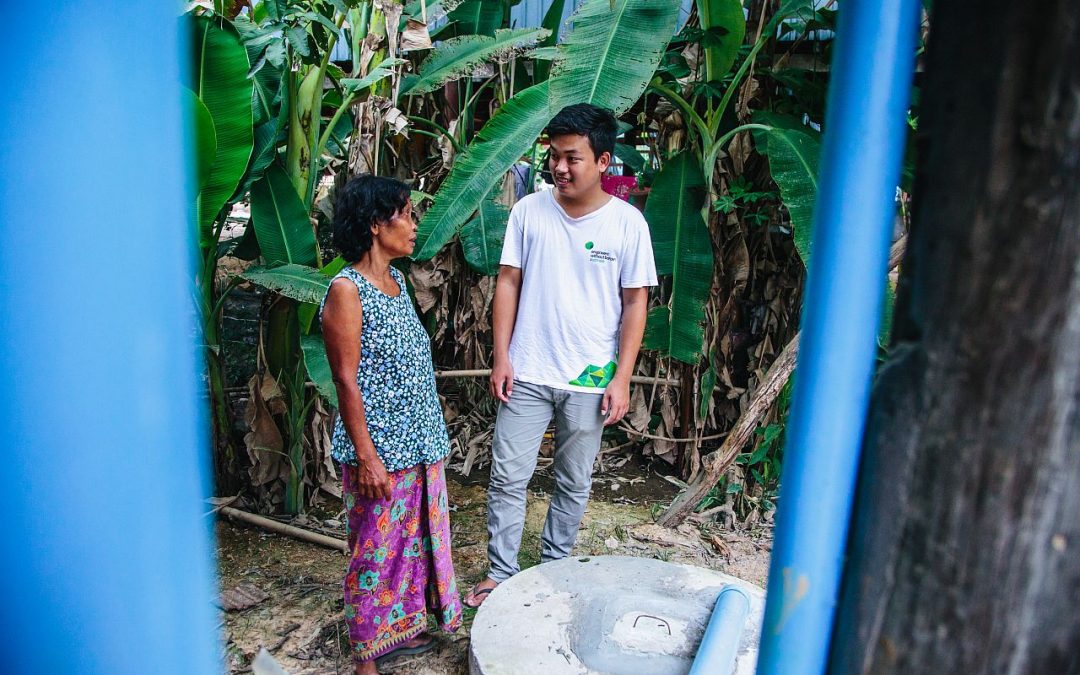Millions of people live in flood prone, mountainous and remote areas – challenging environments where the average toilet system won’t work. Without access to sanitation, people still practice open defecation leaving them vulnerable to disease and pollution. EWB Australia believes everyone has the right to access a toilet, so we use our expertise to train local engineers and enterprises to design appropriate sanitation, and champion policies for improved sanitation solutions for people living in Challenging Environments; helping to make SDG6 a reality.
“I was born in about 50km from Phnom Penh. It’s not as crowded as Phnom Penh and people earn a living by farming. There are a lot of mountains and valleys in this area and it can be a difficult place to live,” explains Piseth Kim, lead facilitator with EWB’s Sanitation in Challenging Environments (SCE) program in Cambodia. “My Bachelors degree is in Water Resource Engineering, and afterwards I did a Masters in Environmental Engineering. Water management is an issue here; Cambodia has the biggest freshwater area in South East Asia but still we can’t manage it properly. The first thing I can do now is to bring all I have learned into my working environment.”
Home to millions of people, the fertile agricultural basin around the Tonle Sap and Mekong river is the largest freshwater system in South East Asia, and is seasonally inundated by flood waters. The Tonle Sap also has many over-water communities who live on the lake. Piseth explains that there is no sanitation infrastructure for these communities. “Living without proper sanitation on the Tonle Sap causes water pollution, which affects the health of these people, who use the water for drinking and as a food source.”
A quarter of Cambodia’s population, approximately four million people do not have access to appropriate sanitation, as they live in floating communities or communities affected by drought, flooding, or high groundwater. Mass-market sanitation installations are not designed to withstand floods or for use over water and therefore are not suitable. Without access to sanitation open defecation is common.
“I feel bad because I have been to other countries where they don’t have to care about sanitation anymore because it is already in place,” He says “but on the Tonle Sap they don’t even know that they should care about it, that it is their basic right to have access to appropriate sanitation. I want to change this.”
Piseth and the SCE team are working on the development of appropriate sanitation technologies for these households. By focussing on technologies that are not only appropriate but also affordable and can be successfully marketed to communities, EWB aims to build a sustainable sanitation market serving these ‘last mile’ customers. “I am working to bring proper technology and solutions to people who live in flood prone communities,” says Piseth “I think the job I am doing can contribute an important part of the solution.”
In the past 12 months Piseth and the SCE team have helped to trial and evaluate four innovative custom designed technologies. These include the HandyPod, a floating sanitation system for over-water households, developed with Wetlands Work!; the SaTo pan with RainWater Cambodia, suitable for communities prone to drought; the ATEC* Biodigester, which produces clean biogas for cooking and lighting from a sanitation management system suitable for flood-prone areas; and the 3 Chamber (3C) pit latrine, which improves the effluent quality leached into the surrounding soil and water environment, developed with iDE sanitation entrepreneurship hub.
“The government are trying to achieve 100% sanitation coverage by 2025, in a country where millions live in challenging environments,” explains Piseth. “One of our challenges is to get people to try something new. We use sanitation marketing to promote these sanitation technologies.” Nonetheless systemic behaviour change and market dynamics are complex, so EWB collaborate with local partners and government institutions to positively influence policies and approaches. ““We are the driving force in Cambodia bringing attention to Sanitation in Challenging Environments,” says Piseth “We work closely with the government and with other WASH organisations to advocate for this important area.”
The team have also drafted SCE guiding principles with the Cambodian Ministry of Rural Development, an important step towards embedding good national policies. “At a national level advocating, facilitating and working with the government sector is really hard, because we are competing with other causes for their attention. But our goal as EWB is that everyone has access to appropriate sanitation technology and knowledge, and this is an important way to deal with this issue.”
Piseth is feeling positive about the future of appropriate sanitation in Cambodia and his important role in developing it. “I am proud of myself to have been given the opportunity and the responsibility to lead other SCE professionals. My being Cambodian is important. We need to develop our own engineering resources here and not depend on expats to come over and solve our problems for us. Having local staff and building local capacity of the younger generation is the most sustainable strategy.”


